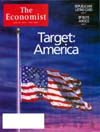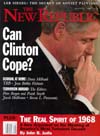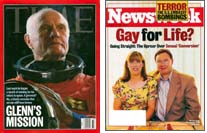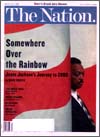
Economist, Aug. 15
(posted Saturday, Aug. 15, 1998)
The cover editorial on terrorism says Middle East radicals hate the United States because of America's peacekeeping efforts in the region. Compared to other Western nations, the United States is extremely hard on Iran and Iraq, which draws the ire of terrorists. A related piece forecasts scary "new terrorism," including biological or poison gas attacks within the United States and "cyber-attacks" that could crash the world's financial and communications systems ... A piece laments the "woes" of Madeleine Albright, whose opinions on Iraq, Israel, and even her pet eastern Europe are ignored by Congress, the White House, and other policymakers. She seems to have "less leverage at the White House than Israel's lobbyists."

New Republic, Aug. 31
(posted Friday, Aug. 14, 1998)
The cover package is split between Washington bimbroglio and Africa bombings: On both scores Clinton is stressed. On the home front, a piece suggests new evasion tactics for Clinton, including the "Roger Defense"--it's my brother's DNA. On the bombing front, an article says that since it's tough to guard against terrorist attacks, Washington should muscle up for a crackdown afterward. Another piece retraces CNN's perilous journey in 1997 to track down Saudi multimillionaire Osama Bin Laden, a suspect in the Africa bombings. (Slate's "Explainer" also scopes out Bin Laden.) ... Like the New York Times Magazine, TNR also recaps the '60s trajectory from "heady liberal optimism" to black power and anti-war frenzy. End result? America graduated from a "culture of toil, sacrifice, saving, and abstinence" to a "culture of consumption, lifestyle, and quality of life."

New York Times Magazine, Aug. 16
(posted Friday, Aug. 14, 1998)
The cover package gushes over the WNBA, "A Sport You Can Love." One piece follows a New York Liberty road trip, admiring the team's genuine camaraderie, warmth, and sheer joy, and calling each game "a celebration of girl power." Another admires women's basketball for discouraging "ladylike behavior" and promoting "raucous ... uninhibited female intensity." ... An essay warns that the rise in intermarriage is excluding blacks. Instead of melting into one brown nation, America may remain two nations: one beige (white-Hispanic-Asian) and one black. ... An article wonders why Americans are still fighting the battles of 1968 while Europeans, for whom those battles were much more intense (Paris students, Prague spring), have moved on. Conclusion: Europeans separate democracy and culture and so did not let the political fights of '68 spill into a cultural war. Americans, who don't separate the two, have transmitted the tensions of '68 to issues of education, religion, race, and sexuality.

Time and Newsweek, Aug. 17
(posted Tuesday, Aug. 11, 1998)
Newsweek's cover story focuses on the gay "conversion" controversy. Exodus International, among the sponsors of the recent round of gay conversion ads, claims it converts 30 percent of its gay participants to heterosexuality. But, as Newsweek notes, Exodus' own ex-gay founders fell in love, left their wives for each other, and quit. A related piece, based on polls, says that Americans back gay rights in theory but dislike public displays of gay affection. The editor of the gay magazine Out urges gays to mingle more with straights and not wall themselves in the "gay ghetto."
Time's cover story drools over John Glenn, calling his upcoming Discovery mission "a timely reminder that we can still have heroes." Why is NASA letting the old bird lift off? Space travel mimics the effects of aging (bone weakening, sleep disruption, etc.), and NASA wants to know if a 77-year-old astronaut will suffer the same disabilities.
Both magazines squeeze in last-minute pieces on the African bombings but save plenty of space for Monica. Newsweek's angle: How does the Clinton legal team prep a probable liar against a known liar? Answer: Smear Monica. Newsweek's scoop: Kenneth Starr's report to Congress will be pared down to cover only Flytrap. Kiss goodbye to Starr's years of work on Whitewater, Travelgate, etc. ... Time's blander package has only one revelation: Tripp kept 80-100 pages of contemporaneous notes about what Monica said, a "skeleton key" for Starr to "reconstruct" the affair.

U.S. News & World Report, Aug. 17
(posted Tuesday, Aug. 11, 1998)
A huge package celebrates great inventors of the 20th century, from household names such as the Wright brothers and Edward Teller to obscurities such as Philo Farnsworth, who invented the television at age 22 only to have RCA copy him, bully him, and reap the economic rewards. One inventor is dissed: Alexander Fleming, a scientist of "mundane skills," accidentally discovered penicillin, but it was Ernst Chain and Howard Florey who actually made penicillin a lifesaving drug. Fleming happily took the credit. U.S. News predicts that living machines will be the great invention of the 21st century. ... The cover package on the embassy bombings suggests that anti-American Saudi millionaire Osama Bin Ladin could have funded the bombers. It also notes the rise of "cushion-shot terrorism": Terrorists increasingly attack peripheral targets, because major targets are too well protected.

The New Yorker, Aug. 17
(posted Tuesday, Aug. 11, 1998)
A piece argues that scientists have grossly overstated the importance of parents in molding their children. In fact, children are shaped mostly by other children, who serve as role models and guides for living. Children tend to resemble parents only because they share genes, not because they are influenced by them. Evidence: Adopted children have as much in common with random adults as with their adoptive parents. ... An article warns that today's stock market conditions dangerously resemble those of 1929. Inflation is low, growth is slowing, the world economy is uncertain, and investors are ignoring repeated warnings by the Fed chairman. Alan Greenspan must stop merely warning and start acting, raising interest rates enough to stop the market euphoria. A recession is inevitable, and we need Fed intervention to ensure it's a mild one.

The Nation, Aug. 24 and 31
(posted Tuesday, Aug. 11, 1998)
The cover story weighs the prospect of a Jesse Jackson presidential candidacy. The Reverend is second to Vice President Gore in opinion polls, drawing 12 percent of Democratic support, and he may be the only candidate who could bring attention to progressive/labor issues. Snags: 1) Jackson is increasingly friendly with Wall Streeters, an alliance that troubles many lefties; 2) he will certainly lose; and 3) he may lack the selflessness required to build an organization that would endure after his loss. Why would he run? Because he is desperate to remain important.
--Kate Galbraith